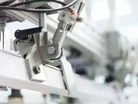How IoT tech shook up the global manufacturing sector

The Internet of Things (IoT) revolution is coming. The world of connected products is already having a massive affect on business, and by 2025 those companies demonstrating the best use of IoT technologies will be up to 10% more profitable, says a recent report*. However, while it is easy to say ‘The IoT will change everything’, sifting through the useless gimmicks and determining what will change, and how, is much more complex, says Mark Lee, Chief Commercial Officer of Intamac, an IoT enabler and innovator, with over a decade of experience in the sector.
The applications for IoT technologies appear limitless. Everywhere you look the headlines are filled with IoT products hitting the market. However these applications are often gimmickry, with the product advantage difficult to identify. As a result, companies often find it hard to see the advantages of connecting their products.
However, while IoT may be thought of as a new technology area, the usual business imperatives still apply. Not least of these being the first obstacle to enterprise adoption: the ROI and revenue model. High value assets like airplanes have been network connected for years – the ROI is clear, being able to identify and fix problems in that industry saves money and lives.
However, as the cost for connecting ‘things’ as well as processing and storing data tumbles, ROI for IoT solutions with much lower value and less life critical products and services becomes easier. It’s for this reason that in 3 years’ time it will probably be harder to buy an unconnected washing machine or boiler than one that is connected. And as more things are connected the opportunity to layer additional value added services on top are clear.
But what are these business values and how do they apply to the manufacturing industry?
Knowing your machines
One of the strongest applications for IoT in manufacturing is remote monitoring and analysis. By having a better understanding of the performance of your machines in real-time, the need for routine maintenance is reduced. Instead machines can be remotely monitored and a maintenance team deployed as and when necessary. The team can also use the analytics to understand what part on the machine isn’t working and take the tools and parts as necessary, to further increase the efficiency of the repair work, and reducing the amount down-time. This information can be collected automatically and in some cases repairs can be carried out remotely which allows teams to become more efficient.
Knowing your usage
There is an increasing amount of pressure on industry from government to reduce carbon emissions. One of the ways IoT technologies can help with this is to provide data on which machines are being used, and how much energy they require. This information can then be used to optimise energy usage for devices.
Knowing the end-user
By 2016 53% of manufacturers will offer smart products. While this will obviously involve new product lines, development and revenue streams, the biggest game-changer will come from the data created by the end-user. This information is readily available to manufacturers, and can be tapped into to discover deep and meaningful insights into the end-user, their behaviours and how they use a product.
Gaining consumer insights through data is not new. Only 5 years after Tesco launched its Clubcard, sales had increased by 50%, arguably down to the new insights the retailer had into its consumers’ shopping habits, how often they shop, what they buy and where. However understanding this data and identifying behaviours through data can also drive new product innovations and give consumers what they need, sometimes before they even know they want it. Alternatively, a company might see that its products are being used in a different demographic or country, identifying a potentially lucrative new market to operate in.
The future of manufacturing
With all the potential applications for IoT technologies in the manufacturing industry, and in the development and manufacture of smarter products, change is certainly on the horizon. Factories will be highly efficient operations, with intelligent products talking to each other, identifying weaknesses in the production line and independently addressing issues as they appear. Data from the end-user will be fed back to the factory instantly, and incorporated into schedules in a matter of hours. Managers will be able to oversee and approve all this information from a tablet, tracking raw materials through the production line, and the location of stock once it leaves the warehouse. Finally product developers will be able to use all the factory and end-user data to create products that the consumer truly wants, and that the factory can deliver, with a profitable outcome.
This industry is moving quickly, manufacturers need to take this opportunity seriously. To be left behind could be highly costly to a manufacturer at this exciting and revolutionary time for the industry.
Mark Lee is Chief Commercial Officer at Intamac Systems. The pioneering IoT enabler is highly innovative in this market, working with OEMs and product vendors to connect products, devices and appliances to the Internet. Since its launch Intamac has connected over 500,000 things, with over 3.5 billion connected device hours.

